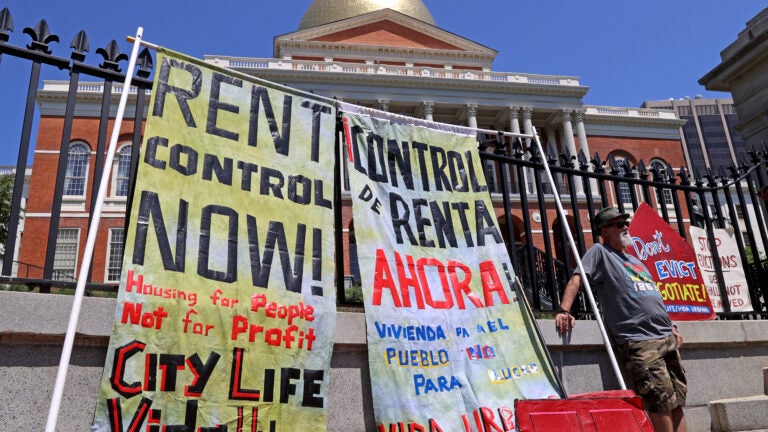Sign up for the Today newsletter
Get everything you need to know to start your day, delivered right to your inbox every morning.

Next year, Massachusetts voters could have the chance to enact rent control across the state.
Homes for All Massachusetts, a coalition of housing advocacy organizations, announced this week that it will be spearheading a campaign to place a ballot initiative in front of voters next fall.
If the measure is approved by voters, annual rent increases in Massachusetts would be tied to cost of living increases, with a hard annual cap of 5%. Owner-occupied buildings with four or fewer units would be exempt, as would newly constructed buildings during their first 10 years of existence.
Rent control was banned statewide in 1994, and some have been trying doggedly for years to reverse the prohibition. Legislation pending in the State House would give communities the option of implementing rent control, but advocates have faced an uphill battle there.
Turning to the ballot initiative process could be more fruitful in a state where voters consistently list the cost of housing as one of their biggest concerns. But many hurdles remain, and the initiative will face stiff opposition from the powerful real estate industry. If the ballot measure is placed before voters but ultimately rejected, future efforts to pursue rent control through the legislative process could be even more difficult.
Homes For All plans to file an initiative petition with Attorney General Andrea Campbell’s office Wednesday. Campbell will then need to certify the petition’s constitutionality. Advocates will need to collect more than 75,000 signatures in support of the petition, a process that can be time consuming and costly. Thousands more signatures could be required next year to ensure the measure is placed on the ballot in the next statewide general election.
“Sky-high rents in Massachusetts are displacing essential workers like nurses and teachers from their communities, and forcing people to work multiple jobs just to pay the rent,” Noemi Ramos, executive director of the advocacy group New England Community Project, said in a statement. “Massive rent hikes are pushing seniors out of the homes they’ve lived in for decades, and making it impossible for young families to save money for a down payment on their first house. As the state works to build more affordable housing over the coming years, we need rent stabilization to protect workers, families, and seniors from out-of-control housing costs today.”
With home prices growing much faster than incomes in Massachusetts, homebuying is unrealistic for many residents who are forced instead to rent or leave the state. Rent is not getting any cheaper, either. Advocates point to research that shows that more than 50% of renters in the Boston area are “cost-burdened.” More than 27% are “severely cost-burdened,” meaning that they pay more than half their income in rent and utilities each month.
With no restrictions on rent hikes, real estate investors are able to snatch up properties and increase rent prices even more, according to research from the Metropolitan Area Planning Council.
“Right now, there’s no limit to how much rent can increase every year, so corporate real estate investors are increasingly buying up homes in our communities, hiking rents astronomically, and evicting anyone who can’t afford to pay,” Denise Matthews-Turner, executive director of the group City Life/Vida Urbana, said in a statement.
Opponents of rent control argue that the practice does nothing to spur housing creation and discourages landlords from upgrading their properties.
Paul Craney, a spokesperson for the Massachusetts Fiscal Alliance, blasted the new ballot initiative in a lengthy statement Wednesday. He called the idea a “failed experiment” that voters rightly rejected in 1994.
“It made housing more expensive, less available, and far worse in quality. In short, it makes lives miserable for renters, landlords, and the communities these buildings occupy. Today’s activists are pushing the same broken policy under a new name, but the result will be the same: fewer new housing units, deteriorating buildings, and skyrocketing costs for those left behind.”
Greg Vasil, CEO of the Greater Boston Real Estate Board, echoed these sentiments.
“Rent control is a failed, misguided policy that stifles housing creation and disincentivizes unit upkeep and maintenance. Rent control supporters continue to resurrect ineffective rent control proposals year after year, offering tenants false hope that will not solve the problem. Government price controls will only make the housing crisis worse,” Vasil said in a statement.
Vasil instead advocated for the state to reduce barriers to housing construction and build homes “across all price points to address the affordability crisis.” The real estate industry is working to cut red tape and help the Healey administration “fulfill the promises of the Affordable Homes Act.”
That housing bond bill was signed into law by Gov. Maura Healey last year. It authorizes up to $5.16 billion in housing investments, but housing advocates say that only $2 billion will be spent over the next five years, and the bill will not create enough new housing units.
Recent high-profile efforts at pursuing rent control faltered. Boston Mayor Michelle Wu attempted to push a plan through the State House in 2023 that would have allowed the city to cap year-over-year rent increases to a maximum of 10%. The real estate industry successfully derailed Wu’s plan.
State Rep. Mike Connolly tried to secure a ballot initiative that would have repealed the rent control ban to let individual communities dictate their own policies. The idea was to put the measure in front of voters last fall, but Connolly and his allies ultimately could not garner enough support.
Ross Cristantiello, a general assignment news reporter for Boston.com since 2022, covers local politics, crime, the environment, and more.
Get everything you need to know to start your day, delivered right to your inbox every morning.
Stay up to date with everything Boston. Receive the latest news and breaking updates, straight from our newsroom to your inbox.
Be civil. Be kind.
Read our full community guidelines.